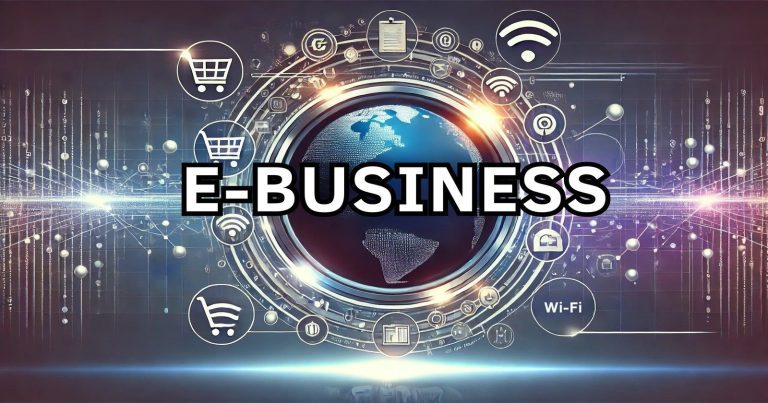E-business has transformed the face of the modern era of doing business and conducting interaction between companies. Efficiency, cost savings, and global reach are not all that e-business offers businesses; it helps them create personalized customer experiences. With the use of digital technologies, companies can manage their operations, communicate with stakeholders, and find profitability in their operations. Below is a detailed discussion of the core concepts, differences, scope, components, and benefits of e-business.
What is E Business?
E business is conducting business through electronic means, mainly on the Internet. It covers a wide range of activities and processes that help organizations streamline operations, engage customers, and manage resources effectively. Online transactions, digital marketing, supply chain management, CRM, and ERP are all covered under this heading. E-business is unlike other traditional business methods, where technology is incorporated into all the operations of a company to make the processes efficient, scalable, and customer-oriented.
E-business supports real-time communication, and such functionality allows businesses to interact with customers, suppliers, and other stakeholders seamlessly. The geographical barriers are also eliminated, enabling companies to operate in the global market without a physical presence. It allows customers to shop, make inquiries, or access various services anytime and anywhere because of 24/7 accessibility. Some of the e-business applications are online shopping portals like Amazon, digital payment systems like PayPal, and collaborative tools like Zoom for virtual meetings. E-business, in its diversified functionalities, enables companies to innovate, reduce costs, and meet evolving consumer expectations in an increasingly digital world.
E business Definition
E-business deals with the incorporation of technology into all aspects including but not limited to marketing, customer care, chain management, and modes of payments. Unlike previous modes of conducting business, e-business allows a company to access people over a huge area cut by geographical bounds while working on the Internet.
E-Business Characteristics
E-business characteristics define its unique approach to conducting operations digitally. These include global accessibility, automation, cost efficiency, and scalability.
- It deals with the automation of activities especially in inventories and selling history.
- Connects businesses, suppliers, and even customers through instantaneous processes.
- It supports 24/7 operations, hence improving access to customers.
Difference between E commerce and E business
Two terms are often confusingly used: e-commerce and e-business. They have different meanings. More of what e-business entails is clarified by understanding the difference between e-commerce and e-business.
- E-Commerce: E-commerce focuses solely on buying and selling products or services online. Websites like Amazon, Flipkart, and eBay are classic examples of e-commerce platforms.
- E-Business: E-business is the term used to describe all online business activities, including e-commerce, customer relationship management, supply chain operations, and more. It involves integrating technology into every aspect of business processes.
| Aspect | E-Commerce | E-Business |
| Definition | Focuses on buying and selling products or services online. | Encompasses all online business activities, including e-commerce. |
| Scope | Limited to transactional processes (e.g., sales and purchases). | Broader scope involving customer relationship management, supply chain operations, and more. |
| Examples | Amazon, Flipkart, eBay. | CRM systems, ERP platforms, digital marketing strategies. |
| Business Processes | Primarily concerned with front-end activities (e.g., order placement, payment). | Integrates technology into both front-end and back-end operations, including logistics and HR. |
| Technology Integration | Focuses on enabling online sales channels. | Involves integrating technology across all business processes. |
| Objective | Generate revenue through online transactions. | Streamline and enhance overall business efficiency using digital tools. |
Benefits of E Business
The benefits of e-business have changed the way businesses operate by adding efficiency, flexibility, and customer-centric approaches to the processes. Old business models evolve into dynamic systems where digital platforms play a central role. E-business is taken advantage of worldwide by companies in order to boost productivity, increase reach, and encourage innovation. Technology can improve operational workflows, reduce costs, and deliver value to customers in exciting new ways.
Worldwide Coverage
E-business transcends geographies and thereby enables businesses to maintain relationships with their customers and markets from all around the world. Such global reach might make even the smallest businesses competitive in the international arena. Companies do not need to have a location in every region; they can advertise their products and services all around the world.
- Online platforms: including Amazon and Alibaba, are proof of how e-business is allowing global commerce by giving the world marketplace to both sellers and buyers.
- Exporters: They have the huge advantage of delivering their products directly to customers all over the world, with the ease of logistics and communication by using many different online tools.
E-business exposure increases revenue streams while allowing companies to explore various markets and overcome the vulnerability of having just local economies.
Cost Efficiency
E-business greatly reduces costs for businesses since it automates processes and minimizes the use of physical infrastructure. Companies do not have to have expansive retail spaces, warehouses, or in-person staffing to interact with customers.
- Automated Systems: Businesses automate routine tasks like order processing, inventory management, and billing. This saves them time and labor costs.
- Digital Marketing: The traditional channels of print and television advertising are costly and not very focused. E-business depends on cost-effective digital marketing tools such as social media, email marketing, and search engine optimization (SEO). These ensure a much better return on investment.
- Removing Middlemen: Selling to the customer directly will reduce the cost associated with the middlemen automatically. Thus, this will enable the companies to price competitively.
Cost efficiency makes businesses use their resources appropriately. Therefore, the profit margin together with business viability is improved.
Improved Customer Experience
The best benefit of e-business is that it provides far better customer experiences. It marks their platforms for customer-centricity, ease of access, and personalization.
- Recommendations: AI analyzes customer behavior and preferences. Later, it directs them towards products or services based on an individual’s requirements. User Interface: Simple interfaces, secure payment gateways, and easy navigation make online shopping and transactions fast and hassle-free.
- 24/7 Availability: E-business platforms operate round the clock, ensuring customers can shop or access services at their convenience, regardless of the time zone.
Through AI and real-time tracking, Flipkart and Zomato are providing customers with a delivery of personalized experience to aid customer loyalty.
Flexibility and Scalability
E-business provides unprecedented flexibility. The company is enabled to respond rapidly to market trends, customer preferences, and technological advancement. Scalability is ensured so that the business can expand operations without requisite investment in infrastructure.
- Cloud-Based Solutions: Cloud computing eliminates the need for physical servers and data centers, enabling businesses to scale their operations on demand.
- Agile Operations: Companies can launch new products or services faster through e-business channels, responding to market needs almost instantly.
- Remote working: e-business tools can help businesses have employees work remotely, saving on office space and satisfying the employees.
Versatility and scalability put businesses in a good position to succeed in dynamic markets and respond to problems with speed.
E-Business and Data
E-business collects and analyzes data in real time for business assistance. Data access is one of the core benefits of e-business, thus keeping companies competitive.
- Customer Insights: Businesses understand customer preferences, purchasing patterns, and feedback, enabling them to refine their offerings.
- Inventory Optimizations: Real-time tracking of stock avoids overstocking or understocking, reducing waste and wastage.
- Market Trends: Data research highlights the trends that companies can then follow to stay ahead of the competition.
For example, Google Analytics provides business data that shows web traffic, user behavior, and sales that businesses can work on to improve their strategy.
Sustainability
E-business is good for the environment since it lessens reliance on natural resources and makes transactions on a digital base. Sustainable activities profit businesses, customers, as well as Mother Earth.
- Minimal use of papers: E-business relies on online communications, billing, and registration as opposed to paper-based works.
- Reduced green gas emissions: The use of e-business leads to less exposure of green gaseous to the atmosphere. It does so through a reduction in traveling and delivery processes that occur physically.
- Eco-friendly packaging: More and more e-businesses are adopting environmentally responsible packaging solutions that show care for the planet.
Scope of E-Business
The scope of e-business is large, covering virtually all industries and touching every function of business activities. It covers such sectors as retail, banking, healthcare, education, and entertainment, where online platforms are crucial to service delivery and customer interaction. Start-ups seek entry into the market using minimal investment via e-business, while multinational corporations use it for global operations that reach out to a diverse pool of customers E-business includes, but is not limited to online sales and marketing, CRM, SCM, ERP, all of which ensure seamless communication, real-time data exchange, and efficient utilization of resources by enabling a response to market trends and consumer demands in no time.
Moreover, it supports innovative models such as e-commerce, subscription services, digital marketplaces, and cloud-based solutions, among others, and makes it highly relevant. In the modern, dynamic economy, it is highly indispensable due to its flexibility and adaptability. It enables any business size to be successful in the digital era.
Applications Across Sectors
E-business is applied in all sectors like retail, banking, healthcare, and education. Some examples of financial institutions are online banking services like PayPal, which offers easy digital transactions. Some examples of non-banking financial institutions are insurance companies, which also apply e-business strategies to offer better customer service. Strategic Benefits are:-
- Global Reach: A business can reach customers all over the world, crossing geographical boundaries.
- Operational Effectiveness: The generation of invoices and inventory management can be automated, which decreases errors and costs.
- Real-Time Data Analysis: This allows a company to understand the trends of consumer behavior and market trends for the proper decision-making process.
Components of E-Business
The successful implementation of the e-business constitutes its foundational elements. These elements form an integral part of the organization and help ensure smooth operations and improved customer satisfaction. The Core Components of e business are:-
- E-Commerce Platforms: These help businesses manage online transactions and the product catalog. Some examples include Shopify and Magento.
- Customer Relationship Management (CRM): The CRM software keeps records and ensures that the interpersonal relationships between a company and its customers make sense.
- Supply Chain Management (SCM): SCM software ensures timely acquisition, production, and delivery by effective procurement, production, and delivery.
- Enterprise Resource Planning (ERP): The ERP software integrates all the functions together in a single system related to HR finance and other business streams.
- Digital Marketing Tools: Business uses digital marketing tools such as Google Ads and social media sites for connection with both potential and existing customers.
Benefits of E business FAQs
What is e-business?
E-business is the conduct of business online, including marketing, sales, customer service, and supply chain management. It integrates digital technologies into every aspect of a business.
How does e-business differ from e-commerce?
E-commerce focuses solely on buying and selling online, while e-business includes all business activities, such as CRM and logistics, that use the Internet.
What are some examples of financial institutions using e-business?
Examples of banking financial institutions include Chase and Citibank, while those of non-banking financial institutions include Paytm for digital payment and Prudential for online insurance.
What are the key benefits of e-business?
E-business provides global access, cost-saving, real-time data analysis, improved customer experiences, and operation efficiency.
How does e-business enhance the customer experience?
E-businesses provide user interfaces that are highly personalized by using AI, they provide easy means of making payments, and they offer 24/7 support to customers.


